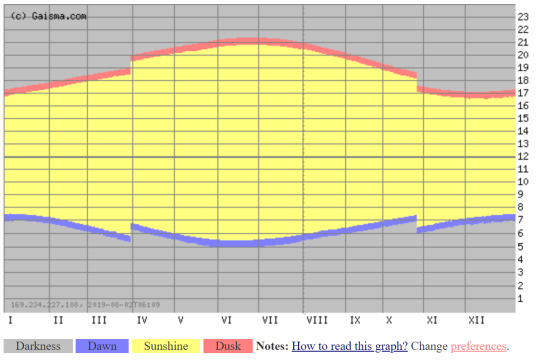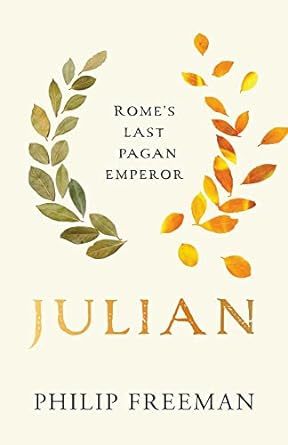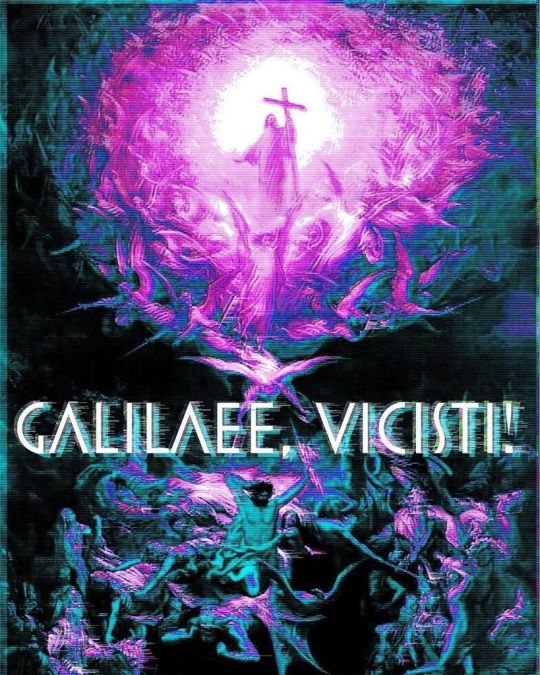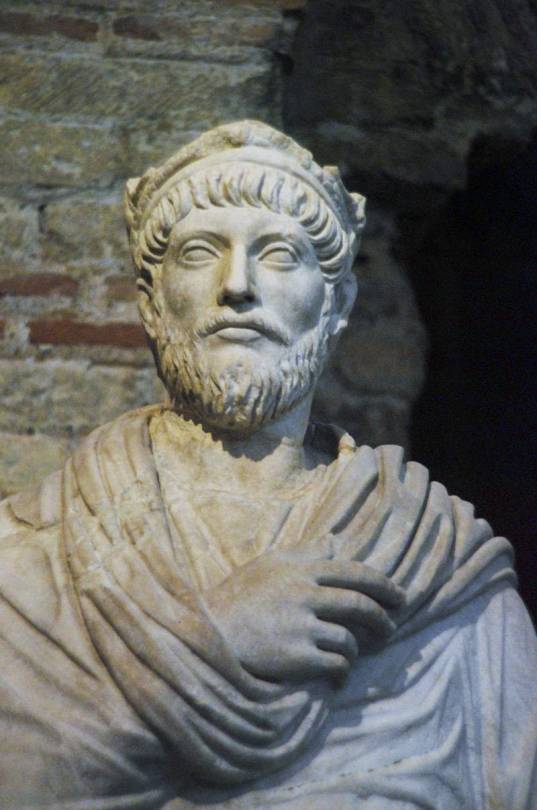#julian the apostate
Text
As late as the fourth century CE in a satire attributed to the emperor Julian, Octavian (the later Augustus) is described as “changing many colors, like a chameleon: becoming now pale and now red”. In the satire, the god Silenus reacts to seeing Octavian by saying, “Bless me, what changeable beast is this! What terrible thing will he do to us!”
For comparison we have Pliny the Elder's comment on chameleons from his Natural History 8.120: "And [the chameleon] is more miraculous for the nature of its color, for it constantly changes its eyes and tail and entire body, and always resembles whatsoever it touches last, except red and white”
Pliny’s mention of the chameleon’s inability to turn “red and white” (rubrum candidumque) makes Julian’s description of Octavian turning pale (ὠχριῶν) and red (ἐρυθρὸς) take on a greater significance because it shows that Octavian is then more skilled than a chameleon at changing color by possessing the capability to turn both red and white.
Although Silenus' comment makes it clear that Octavian's color-changing should be seen as a reflection of his instability and danger, the change in color could also be an allusion to Octavian's constant change in health as ὠχριῶν refers to becoming pallid. Pliny further strengthens this reading by writing that when dead, chameleons are pale (defuncto pallor est). Thus Octavian is constantly changing between a state of near-death and great vitality as implied by Julian's ἐρυθρὸς and Pliny's rubrum, both of which can mean having a ruddy complexion.
#tagamemnon#Octavian#Augustus#pliny the elder#Julian the Apostate#Roman history#Latin literature#Ancient Greek
228 notes
·
View notes
Text
The First Day of Julius Caesar
Hello and welcome to the first day of my series! I choose to start not with a common misconception, but with a personal story that includes a very uncommon misconception that was all my fault. I thought it would fun to start things off.
When I was in eighth grade, I was a fan of Julian the Apostate. It was definitely because I went to a Catholic school while I disliked Catholicism. Young me was like "Omg I relate so much to Julian the Apostate!!"
(nowadays I feel quite embarrassed by my Julian the Apostate phase)
Anyway, I was in religion class and I was explaining Julian the Apostate to my religion teacher (as if a Catholic religion teacher would like him). Suddenly and to my utmost surprise, she was like "I know that person! He is my favourite historical figure!"
I had not expected the average person to know about Julian the Apostate, but I guessed that my religion teacher, as part of her training, had to learn about the religious history of Rome and that's where she learned about him.
My guess turned out to be very wrong. The more my religion teacher talked about him, the more I started to realise that we were not talking about the same person. Because Julian the Apostate definitely had nothing to do with the Julian Calendar or alea iacta est or the Ides of March and uh oh my religion teacher got him confused with Julius Caesar!
I was so baffled and embarrassed on her behalf that I didn't correct her. I never saw her again after eighth grade, so for all I know, her favourite historical figure might still be Julian the Apostate, the last pagan Roman emperor who was very influential in the end of the Roman Republic.
I'm actually quite concerned for her, because she was definitely a Julius Caesar fan in all the wrong ways, if you get what I mean. Which was made even worse by the fact that she was a religion teacher! I don't think Jesus would've been a Julius Caesar fan in that way. Actually, I don't think Jesus would've been a Julius Caesar fan, period.
Moral of the story, Julian the Apostate is NOT to be confused with Julius Caesar. One is named Flavius Claudius Julianus and the other one is named Gaius Julius Caesar. One lived, laughed, loved during the fourth century AD and the other lived, laughed, loved during the first century BC.

Don't be like this. And don't be like me either, who didn't correct my religion teacher out of embarrassment. I am making this series to undo the harm I caused that day haha.
I have a special interest in ancient Rome, and not a PhD. I am just some random Canadian teenager. I will try my best to be as historically accurate as I can in this series, but I'm human (and nothing human is alien to me) and I can make mistakes. Don't see anything I say as infallible, okay? And feel free to correct me. After all, this series is about correcting mistakes.
Thank you and I'll see you tomorrow with some actually common misconceptions about Julius Caesar!
81 notes
·
View notes
Text
My unverified personal gnosis is that Daylight Savings Time (DST) is sacrilegious. Twice a year, DST violently disrupts our perception of and connection to the gradual seasonal drift of sunrise, sunset, and the length of the day. As I have gotten older, I have taken more notice of the annual patterns of the sun. I feel like I acquired an "internal calendar" in the same way that sunrise and sunset regulate our "internal clock" (circadian rhythm).
As an illustration, here is how DST shifts our perception of sunrise and sunset relative to a fixed system of 24 hours in Rome [source]:

I’m pretty sure that if Emperor Julian had succeeded in saving polytheism that we wouldn't have to deal with DST in the modern era. The cycle of the sun would be widely considered sacred and messing with our perception of it like this would be sacrilegious.
By the way, permanent Standard Time is superior from a public health perspective to permanent Daylight Savings Time.
56 notes
·
View notes
Text
"The Sun’s resplendent deity I sing, the beauteous offspring of almighty Zeus; who, through the vivifying solar fount concealed within his fabricative mind, formed a triad of splendid solar gods; from whence the world’s all-various forms emerged from mystic darkness into beauteous light, perfect, and full of intellectual goods.
Hail! Supermundane king of light divine, and fairest image of the unknown good: For, as the light proceeding from the one, the god of gods, and beauty’s matchless flower, intelligible, with deific rays, occult, illuminating; so from Apollo’s beams, exulting glorious through harmonic power, the mental world with elevating light is filled exuberant: and the apparent Sun largely diffuses through the world of sense, light, all-prolific, beautiful, divine."
- Emperor Julian, To Apollo-Helios
#apollo#apollon#apollo deity#hellenic polytheism#Emperor Julian#Julian the apostate#greek gods#roman gods
34 notes
·
View notes
Text
My favorite part of the Julian crack-fic post is all the people mistaking a Roman emperor for a cartoon lemur:






104 notes
·
View notes
Text

As someone fascinated by Roman history, I asked for this book last Christmas and I must say that I wasn't disappointed. The story of the philosopher emperor Julian is told in a detailed and entertaining way. To anyone interested in late antiquity and the history of religion, or simply by the tale of a man of high ideals who came to rule a troubled world, I highly recommend this book.
#ancient rome#roman empire#late antiquity#julian the apostate#hellenic polytheism#christianity#against the odds#neoplatonism
8 notes
·
View notes
Text
ON THIS DAY, 363 AD
JULIAN the APOSTATE launches his PERSIAN CAMPAIGN, leading to his DEATH in BATTLE

#history#ancient history#ancient rome#roman#meme#memes#julian the apostate#shapur#persian#rome#apostate#classics#caesar#julian
4 notes
·
View notes
Text

Favourite Roman Emperors (1/5)
Julian, the Philosopher.
#roman empire#Ancient Rome#Ancient Rome aesthetic#Roman empire aesthetic#moodboard#aesthetic#Rome#Roman Emperor#Julian the Apostate#Julian the Philosopher#Emperor Julian#Emperor Julian aesthetic#Oscar Isaac
2 notes
·
View notes
Text
An Epitaph for the Emperor Julian
Anthologia Palatina 7.747 = Libanius (314-394 CE)
Note: Line 2 of the couplet quotes Homer Iliad 3.179, where Helen uses it to describe Agamemnon.
Julian lies here, beyond the swiftly flowing Tigris –
“Both a noble chieftain and a spearman full of might.”
Ἰουλιανὸς μετὰ Τίγριν ἀγάρροον ἐνθάδε κεῖται,
ἀμφότερον, βασιλεὺς τ᾽ ἀγαθὸς κρατερός τ᾽ αἰχμητής.

Gold solidus of the Roman emperor Julian (r. 361-363 CE), dubbed "the Apostate" by Christian writers due to his attempt to restore traditional Greco-Roman religious practices. Artist unknown; minted at Antioch. Photo credit: Classical Numismatic Group, Inc. http://www.cngcoins.com
#classics#tagamemnon#Greek#Ancient Greek#Greek language#Ancient Greek language#Greek translation#Ancient Greek translation#poem#poetry#translation#poetry in translation#ancient history#Roman Empire#Late Roman Empire#Emperor Julian#Julian the Apostate#late antiquity#couplet#dactylic hexameter#epigram#epitaph#Libanius#Anthologia Palatina#Palatine Anthology#Anthologia Graeca#Greek Anthology
60 notes
·
View notes
Text
youtube
What would have happened if the Roman emperor Flavius Julian, better known as Julian the Apostate for renouncing Christianity in favor of Paganism, had decided not to invade Persia, a conflict in which he was killed, and instead dedicated himself to his project to restore the old religion and reform the Empire?
2 notes
·
View notes
Text

Roughly translated from the Latin "You have triumphed Galilean". The reported last words of Julian the Apostate.
#traditional catholicism#traditional catholic images#traditional catholic modern art#vapor wave#cath wave#traditional catholic history#julian the apostate
0 notes
Text

Julian firing most of the palace staff and cancelling the ceremonial court rituals
#Julian the Apostate#he was so real for this#ancient rome#late antiquity#roman history#dominate#principate#memes#memetics#memeology
112 notes
·
View notes
Text

Elizabeth Finch by Julian Barnes
This novel took off brilliantly, grabbing one straight away. I was very excited.
However…. The middle section is like a long thesis on Julian the Apostate which while putting forward some very interesting ideas on the last fourteen hundred years without Christianity, is still a bit like reading a thesis. But the hypothesis about the world without Christianity is a very interesting one, (if perhaps simplistic and flawed), and definitely one to start a discussion about.
The last section was then a little disappointing and the ending felt like Barnes didn’t know what to do with the story.
However, I would say definitely worth reading for the writing, some lovely imagery, about hand prints and some wonderful philosophical ideas that make you think.
So yes, all in all recommended.
Courtesy of NetGalley.
1 note
·
View note
Text

this is what texting with me is like
#i was trying to send him a picture of my bunny#which i did! i just. also sent him julian the apostate
438 notes
·
View notes
Text

😘HI SEXY😘

11 notes
·
View notes
Text
Does anyone else remember how the recon pagan community absolutely abhorred Platonism in ye olde 2010s? (lol). God forbid you quote a source from late antiquity or else you’d be called “basically a Christian”
#thinking of this bc I’ve realized I’m basically a Neoplatonist in the ways that matter#also weirdly this happens in academia too#where Platonism is considered Christianity Lite#I’m going to make a post about this someday but#Julian the Apostate claiming a Platonist understanding of the gods does not make his polytheism less genuine somehow#also it’s not like traditional religion was extinct by the time he came to power#but I’ll get into that… someday
4 notes
·
View notes